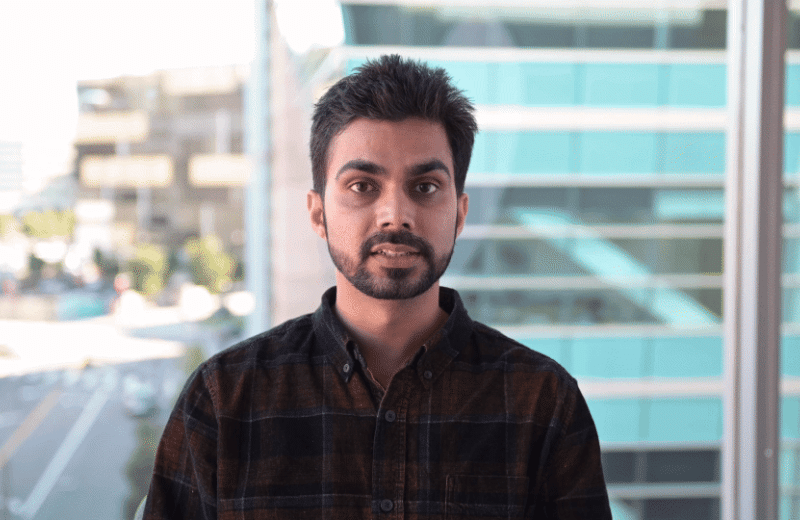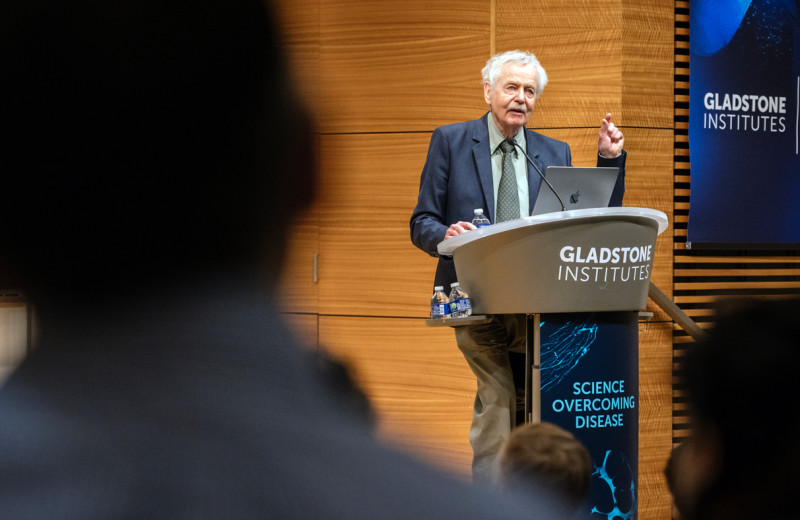Gladstone NOW: The Campaign Join Us on the Journey✕

Natasha joined Gladstone in 2016 as director of the Genomics Core facility. Originally from Italy, she completed her PhD in molecular biology at the University of Cambridge in England.
What brought you to Gladstone?
After many years spent in England, first for my PhD and then working for Discuva (a start-up aimed at finding new antibiotics), my husband and I decided to start a new chapter of our life somewhere else. We both love traveling, living in new places, and challenging ourselves. We looked at a map of the world, searching for a vibrant international environment where we could find a cluster of science and tech, and a place that was sunnier than England—and that’s how we decided to move to the San Francisco Bay Area!
I was looking for a position where I could combine my passion for next-generation sequencing with my project management skills, and Gladstone needed someone to bring in new services and technologies to its Genomics Core. I love sequencing, and Gladstone is an interesting place, so I knew this was the right next step for me.
What do you like about Gladstone?
I really enjoy working in mission-driven, intellectually stimulating, and international environments, which is a matching description of the Gladstone Institutes! In addition, the close relationships that exist with the UCSF community and neighboring Bay Area companies make it an unbeatable place to work.
Another perk is that Gladstone has outstanding core facilities that provide state-of-the-art services to the scientific community. In my role, I get to work with many excellent researchers working at the cutting-edge of different scientific areas, and that’s very rewarding. In addition, the group of core directors is invaluable, and I appreciate the support we offer each other. Last but not least, everyone at Gladstone is always happy to help and the level of the science is outstanding.
Were you interested in science as a child?
I was not interested in life sciences at first. I preferred math and English as a kid, until I started studying genetics early in high school. That’s when a fascinating new world opened up in front of me.
One episode in particular is still so memorable, even my old schoolmates remember it. When my biology teacher tried to convince me that 97% of our DNA was “junk DNA,” with absolutely no function at all, I was really upset and remember arguing with her. How could it be possible that most of our code of life was junk?! I couldn’t imagine that so much of our DNA had no meaning, so I wanted to study it. Nowadays, we know that this part of the DNA has many regulatory functions that we are still trying to understand, and I’m glad we no longer call it “junk DNA.”
Why did you decide to go to graduate school?
It was the natural continuation of my studies, considering I enjoyed molecular biology and wanted a career in science. When I decided to pursue a PhD, next-generation sequencing technologies were just starting to arise, and it was breathtaking to imagine all the possibilities they could eventually enable. I wanted to be part of the revolution, and use these technologies in my experiments. I’ve been working in next-generation sequencing ever since.
What or who influenced your decision to work in science?
My parents constantly encouraged me to find something I was passionate about, and do my very best. I always wanted to work in a field where my work could help people and further medical research. I was initially inclined to scientific disciplines like math and physics, but when I found my passion for genetics and molecular biology, I knew that was my path.
What is genomics and how is it used at Gladstone?
The Oxford Dictionary defines genomics as “the branch of molecular biology concerned with the structure, function, evolution, and mapping of genomes.” Many researchers at Gladstone are trying to better understand what is happening inside cells from a molecular biology standpoint, and genomic technologies can help. For example, next-generation sequencing can read what is written on a genome. In the past 10 years, the increase in throughput of sequencing completely transformed molecular biology. Modern sequencing technologies have also become much faster and the cost to use them has decreased.
In our Genomics Core, we perform next-generation sequencing experiments for Gladstone and UCSF scientists, focusing especially on the analysis of RNA, which is the molecule transcribed from DNA. We can understand, for example, which genes are expressed and which are not in various experimental conditions. Recently, our group has been working on hundreds of single-cell samples, helping scientists gain insights on a cell-by-cell level, instead of a global, cell-population level. In addition, we are constantly looking to expand our range of services with the latest techniques, so we are now experimenting with long-read sequencing and new single-cell technologies.
Actually, we have an opening right now for a research technologist in the Genomics Core; anyone interested in joining us?
What do you do when you are not working?
I have a long commute, so I tend to relegate most of my activities to the weekend. I like meeting friends for dinner, reading books near the fireplace or the swimming pool, and traveling with my husband. I really enjoy travelling! My husband and I have a map of the world in our house, and we add a pin to each country we visit, though we still have so many places to visit! Now that we live in California, we are so much closer to places we want to explore that were too far away from Europe, including Central and South America, East Asia, and Oceania. We are also exploring the US and the national parks; the landscapes are so different to those on the old continent. Of course, I miss the low-cost flight options that allowed us to spend a weekend in a European capital (which is hard to beat!), but I’m also very much enjoying our Californian life of exploration.
If you could learn to do anything, what would it be?
I would love to learn how to play the piano professionally. I took piano lessons for a few years when I was a young kid, but then abandoned them, so I would love to pick that up again. I would also like to learn a few new languages. I’m starting with Spanish this year, let’s see how that goes!
What is your hidden/unique talent?
Among my friends, I’m famous for baking Italian cakes. Especially when I haven’t performed experiments in the lab for a while, I feel the need to create something yummy in the kitchen. My childhood dream was to have a bakery, but I only really started experimenting with baking when I moved to England. I have a sweet tooth, so I was craving Italian sweets, but I couldn’t find any. So, I decided it was time to start making them on my own, following my mom’s recipes. All my friends now adore my “famous” yogurt cakes and tiramisu.
Name one thing that not many people know about you.
I love science fiction movies. When I was a young kid, my favorite movie was Back to the Future. I must have watched the whole trilogy a few dozen times. I’m also a hard-core Star Trek fan. I realized that many people here in the Bay Area have the same interests, which is probably why it feels like home!
If you could meet any scientist from any point in time, who would it be and why?
I would love to meet Leonardo da Vinci, the Italian scientist, engineer, and artist from the Renaissance. He was a genius and it’s amazing how many contributions he made to such different areas of science and art. I still remember when I visited the Leonardo da Vinci Museum in Milan with my family. The museum has the most important collection in the world of machine models created from da Vinci’s drawings. I was particularly fascinated by the reconstruction of his flying machines, and I would love to discuss the design process with him!
Which book are you reading now?
I’m reading The Headspace Guide to Meditation and Mindfulness by Andy Puddicombe, as I have recently started exploring various meditation techniques to increase mindfulness and concentration of the mind. I started practicing meditation last year, and it’s fascinating how much insight you can gain focusing only on your mind.
Want to Join the Team?
Our people are our most important asset. We offer a wide array of career opportunities both in our administrative offices and in our labs.
Explore CareersMeet Gladstone: Shyam Jinagal
Meet Gladstone: Shyam Jinagal
Shyam Jinagal explores how genetics, aging, and regeneration shape the heart—and how those insights could one day restore heart function after injury.
Graduate Students and Postdocs Profile Cardiovascular Disease Srivastava LabA Sculptor of Modern Regenerative Medicine
A Sculptor of Modern Regenerative Medicine
Among his myriad accomplishments, Rudolf Jaenisch—winner of the 2025 Ogawa-Yamanaka Stem Cell Prize—was the first to demonstrate the potential of induced pluripotent stem cells to treat disease.
Awards Ogawa Stem Cell Prize Profile Regenerative Medicine Stem Cells/iPSCsMeet Gladstone: Shijie Wang
Meet Gladstone: Shijie Wang
Shijie Wang, a postdoctoral scholar in Steve Finkbeiner’s lab, uses artificial intelligence, robotics, and stem cell technologies to uncover how brain cells die in neurodegenerative diseases like Alzheimer’s and Parkinson’s.
Profile Neurological Disease Finkbeiner Lab AI Robotic Microscopy



